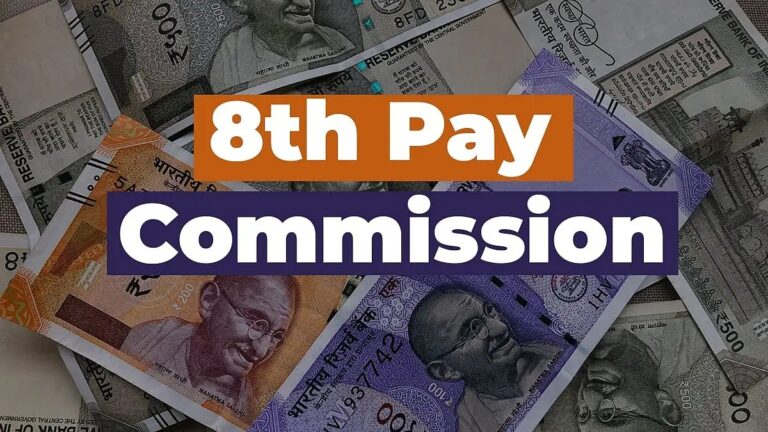
Uncertainty Lingers as 8th Pay Commission Faces Potential Postponement
The wait for the much-anticipated 8th Pay Commission has extended beyond initial expectations, leaving nearly 1 crore central government employees and pensioners in a state of anticipation. While the commission’s Terms of Reference (ToR) remain pending, the delayed timeline has raised concerns about the financial implications for millions of workers. Unlike previous commissions that adhered to structured timelines, the current delay threatens to disrupt the fitment factor—a critical multiplier that determines salary adjustments. Analysts warn that each month of postponement could erode potential earnings, creating a ripple effect across the public sector. Despite the uncertainty, officials have not yet provided a definitive timeline, leaving employees to speculate about the future of their compensation structures. The absence of formal guidelines has sparked debates about the efficiency of bureaucratic processes and the urgency of addressing long-standing salary disparities. As the clock ticks toward potential 2026 or 2027 deadlines, the focus remains on how these changes might reshape the financial landscape for government workers.
Historical Context and Current Delays: A Tale of Two Commissions
Comparing the timelines of past pay commissions reveals a stark contrast to the current situation. The 7th Pay Commission, established in 2014, took nearly two years to implement, with its report finalized in 2016. This period allowed for Cabinet approvals and phased implementation, which is now absent for the 8th Commission. Reports from The Economic Times suggest that internal discussions are ongoing, but concrete steps remain elusive. The lack of a formal Terms of Reference (ToR) has left employees in limbo, with no clear roadmap for the upcoming revisions. While some speculate that the delay is due to complex negotiations over pay scales and pension adjustments, others point to bureaucratic inertia as the primary obstacle. The absence of a structured timeline has also fueled concerns about the fairness of the process, with critics arguing that the prolonged delay could disproportionately affect lower-income employees. As the government continues to navigate these challenges, the focus remains on balancing administrative requirements with the needs of its workforce.
Pay Revisions: From Complexity to Simplification
The evolution of pay structures under previous commissions offers insight into the potential reforms of the 8th Pay Commission. Before the 6th Pay Commission, over 4,000 distinct pay scales created a fragmented system that lacked consistency. The introduction of Pay Bands and Grade Pay in 2015 streamlined this process, grouping similar roles under broader categories. The 7th Pay Commission further simplified things by replacing Grade Pay with a 24-level Pay Matrix, ensuring transparency in salary progression. The Fitment Factor, set at 2.57 during the 7th Commission, became a key tool for calculating revised salaries, multiplying existing basic pay to determine new figures. While the 8th Commission may not repeat these exact measures, experts suggest that the focus will likely remain on simplifying complex structures and ensuring equitable adjustments. However, the absence of a finalized ToR means these changes remain speculative, leaving employees to rely on historical patterns for predictions.
Fitment Factor Speculation and Employee Anxiety
The Fitment Factor, a crucial element in determining salary revisions, has become a focal point for speculation. Analysts estimate that the factor for the 8th Pay Commission could range between 2.5 and 2.8, translating to a modest yet meaningful increase for most employees. However, without official confirmation, these figures remain theoretical. The uncertainty has led to a surge in online discussions and forums where employees share theories about potential adjustments. Some argue that a higher factor could address long-standing grievances about stagnant wages, while others caution against overoptimism. The lack of transparency has also prompted calls for more detailed information about the commission’s methodology, particularly regarding how pensions and allowances will be recalculated. As the wait continues, the emphasis on clear communication from authorities has grown, with many urging the government to provide regular updates to manage expectations.
Strategies for Employees Amid Uncertainty
With no official timeline or structure in place, central government employees are advised to adopt a cautious yet proactive approach. Experts recommend staying informed through official channels and monitoring updates from the Department of Personnel and Training. While the absence of a finalized ToR makes precise predictions difficult, historical data from previous commissions can offer a rough framework for anticipating changes. Employees are also encouraged to prepare for potential adjustments by reviewing their current pay structures and understanding how the Fitment Factor might apply. Additionally, engaging with trade unions and employee associations could provide valuable insights and collective bargaining power. As the government works to finalize the commission’s parameters, the focus remains on balancing administrative efficiency with the need to address the financial concerns of its workforce. The path to resolution may be uncertain, but the demand for clarity and transparency continues to grow.



